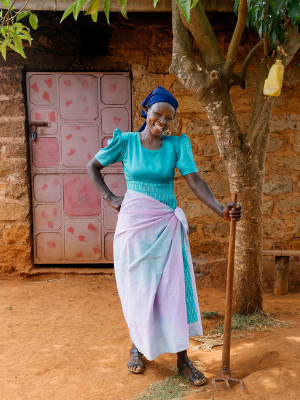 From morning cups of coffee to the successful operations of our homes and businesses—water is essential to our daily lives. Imagine your morning, your afternoon, and your bedtime routines without access to safe water. What challenges would you experience? How would this limit your choices? What would a lack of access to water prevent you from doing?
From morning cups of coffee to the successful operations of our homes and businesses—water is essential to our daily lives. Imagine your morning, your afternoon, and your bedtime routines without access to safe water. What challenges would you experience? How would this limit your choices? What would a lack of access to water prevent you from doing?
Right now, a lack of access to safe water at home is why 771 million people around the world remain trapped in a cycle of poverty. And those who suffer the most are women and girls, which is critical to highlight since it is International Women’s History Month. Their lives are disproportionately affected by the water crisis as they have no choice but to spend hours daily, collecting the water their families need to survive. Globally, women and girls spend 200 million hours on the task each day. Time and energy spent collecting water means time and energy not invested in opportunities like earning an income, starting a business, or going to school. This is why the global water crisis is a women’s crisis.
And this is why theglasshammer.com is bringing this issue to our readers. As part of the global community of women, we have the opportunity to use our influence to make a positive difference in other women’s lives.
The water crisis is a women’s crisis
There is an inextricable link between the global goal to ensure universal access to clean water and sanitation by 2030, Sustainable Development Goal 6, and the global goal to achieve gender equality and empower all women and girls, Sustainable Development Goal 5. To solve gender equality, we must solve the water crisis. And to solve the water crisis, we must look to new sources of capital.
Ending the water crisis will unlock the power and potential of women and girls globally but right now, there is not enough money dedicated to solving it. This is why millions of women, girls, and their families remain trapped in a cycle of poverty, unable to realize their potential as contributors to their household incomes and the global economy. The World Bank estimates that to achieve universal access to safe water and sanitation, it will cost approximately $114 billion a year between now and 2030, and those are only the costs for constructing new infrastructure, not the costs of operating and maintaining infrastructure over time. Meanwhile, Official Development Assistance (ODA) hovers around $13 billion a year – far short of what is needed. Mechanisms that strategically use donor finance to catalyze private investment are critical to filling the financing gap, and Water.org is well-poised to help the global community move forward.
Empowered women empower other women
This is where you, your position as a leader, and your philanthropy can help drive change for women living in poverty. The reality is access to a water tap or toilet at home costs money upfront and women who lack access to safe water and sanitation often cannot afford the investment. Water.org focuses on removing this financial barrier.
With your support, we help women and families in need get access to small loans through our local, partner financial institutions so they can pay for the upfront costs of establishing lasting water connections and sanitation solutions. They make affordable payments over time and their loans are repaid at a rate of 99%. This is because with safe water at home, they can swap the hours once spent on water collection for time to earn and explore their financial potential. This approach gives women choices, it is immensely empowering, and it is working. To date we’ve helped change more than 43 million lives with safe water and the pace of our impact is increasing.
An investment in water is an investment in women
Our solution is in high demand, sustainable, and reaching people in need. Eighty-eight percent of borrowers are women and the majority of households borrowing the loans live on less than $3.73 a day. Your investment in water will help reduce poverty and give women more choices.
Join us. Our work to help the world reach a critical goal – safe water and sanitation for all – drives our desire to make a dollar go as far as possible. Our donors recognize that giving to Water.org is a smart investment. And our funding partners know that working with us is a smart business decision. Together, with women leaders like you, we can change more lives, faster and more efficiently.
Call-to-Action: Go to Water.org to learn more about how you can help empower women, girls, and their families with affordable, lasting access to the safe water they need to survive and thrive.

 By Melissa J. Anderson (New York City)
By Melissa J. Anderson (New York City) By Melissa J. Anderson (New York City)
By Melissa J. Anderson (New York City) By Melissa J. Anderson (New York City)
By Melissa J. Anderson (New York City) By Melissa J. Anderson (New York City)
By Melissa J. Anderson (New York City) By Kelly Tanner (New York)
By Kelly Tanner (New York) By Melissa J. Anderson (New York City)
By Melissa J. Anderson (New York City) By Melissa J. Anderson (New York City)
By Melissa J. Anderson (New York City) By Melissa J. Anderson (New York City)
By Melissa J. Anderson (New York City) By Melissa J. Anderson (New York City)
By Melissa J. Anderson (New York City)